INVITING APPLICATIONS
14th SSF EXCELLENCE AWARDS & RECOGNITION – 2025
LAST DATE: JUL-25 | APPLY NOW
JSW Global Business Solutions (GBS) has been a forerunner in people practices for business value. The stellar achievements of the organization were acknowledged and recognized by Shared Services Forum (SSF) India in 2019. They were conferred the SSF Excellence Award 2019 for Excellence in ’Delivering Business Impact through Innovative People Practices.’– ed.
Work patterns today are changing at a breakneck speed and only organizations and leaders with the ability to adapt to change with the same speed can hope to be successful in the long run. This is true both for business as well as people practices. The talent landscape too is rapidly changing. For the modern-day professionals, factors like open culture, respect for individuals, care and flexibility are as important as attractive compensation and professional growth.
There are constant battles each day – between employment and the economy at the macro level and between employability and staying relevant at the micro level. Hence, it is important for leaders to consistently engage and deliver the right message to their employees – on the company’s strategies, business goals and their own contributions towards both. People have to constantly evolve to adapt to the unpredictable business environment and technology progression, thereby making training and up-skilling critical, in order to remain employable and relevant. At the same time, the employers have to provide a diverse, inclusive and empathetic workplace to improve affinity and enhance productivity. In addition, employers need to constantly engage with their employees to provide a trustworthy, stable and growing environment to their people.
JSW Global Business Solutions (GBS), a captive shared services centre of JSW group, is a less-than-four-years-old organization, created to provide shared services to all the group companies, primarily but not limited to Finance & Accounts, Commercial and HR practices.
People Practices – A Core Business Value
The people practice policies within GBS have been designed with the focus on building employee satisfaction, creating next-gen leaders, developing a robust leadership pipeline, improving cultural connect and managing change. However, all of this must start, by building trust and improving social footprint. The leadership at JSW firmly believes that in order to do so, the three critical areas to be considered are gender sensitivity, engagement and people development. Multiple HR practices have been chalked out specifically to promote actions in this direction.
-
Diversity & Inclusion – a springboard: As one of the fast-growing captive shared service centers, JSW GBS has been working towards creating an empowering and rewarding working environment for women. The company puts gender equality on top of its agenda and makes diversity one of its key business and people strategy components.
Under its flagship program called ‘Girl Power’, some of the HR practices followed are:
-
The JSW Women Leadership Program focuses on the women’s development journey at JSW and is conducted in 3 stages:
- Stage 1 comprises online assessments of cognitive abilities – verbal and numerical reasoning
- Stage 2 is where the women employees are invited to the In-person Development Centre where they receive insights on their strengths as well as development areas against predefined critical success competencies for women leaders, which are linked to JSW potential indicators.
- Stage 3 is where a leadership development roadmap is designed for each woman employee keeping their focus areas in mind

-
Gender sensitization workshops for all employees are conducted on a regular basis to improve appreciation of inclusion and ownership of responsibility. Diversity and inclusion trainings like ‘Unconscious Bias’ workshops are conducted to reduce prejudice and discrimination in the workplace while facilitating equal and positive environment. This helps people realize their possible unconscious or subconscious actions, which may come across as being gender insensitive.
-
It is important to respect and protect women’s rights in a workplace, since women are being encouraged to enter the work force in increasing numbers, so that they are free from unwanted harassment. Harassment of any sort, especially if it is gender or sexual in nature, lowers productivity and hampers psychological well-being. To address this issue JSW has formulated a Prevention of Sexual Harassment (POSH) Policy. Awareness and sensitization training programs are organized for all employees at all levels. For all new recruits, it is a part of induction and mandatory to attend POSH online training.
With the intention of keeping all such matters confidential for the safety of the women employees, a helpline called ‘Samman’ has been established for reporting of sexual harassment incidents. An Email address has also been created to allow written reporting of incidents, if needed. Further, in order to encourage women employees to speak up without fear of retribution, the entire process is managed by an external senior counsellor and is kept in strict confidentiality.
-
Learning programs specially curated for women. While supporting women employees feel safe, the organization also carries out ‘ZEN’ programs designed to build confidence amongst women. Such programs enable women employees to become better leaders by creating a space that allows them to challenge their assumptions, confront their fears and turn obstacles into opportunities. It helps them understand the nuances and power of networking, building and leading effective teams, creating their own presence and developing happier personal and professional lives.
- Special provisions for expecting mothers, mothers of small children and other special cases:
-
Relaxed leave policies. For instance, apart from the statutory maternity leave, extra 30 days of fully paid maternity leave is available to women employees.
-
Performance appraisal safeguard. Women employees who have worked for six months or less during a year on account of maternity leave are given a ‘good’ rating by default. Those who have worked for more than six months in a year are given a rating of either ‘good’ or the previous year’s rating, whichever is higher.
-
Creche services for working mothers. This is run by a professional crèche service organization. All women employees with young children can bring in their children and be assured of their well being.
-
In-house consultant lady doctor to specifically support women employees
The outcome of the above policies has been more than heart-warming:
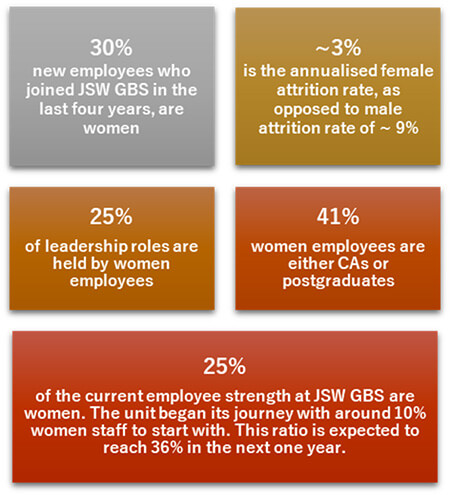
-
-
-
We Care’ program for effective employee engagement has been specifically designed to create a sense of belonging and kinship between the employees and the company, and amongst employees themselves. Under this extremely intense program, a series of support and developmental programs have been created with the intention of providing the most conducive work environment to the employees and, at the same time, providing to the organization a highly trained, motivated and passionate group of employees.
A core JSW belief is that development cannot be one-sided. To expect a superior outcome from professionally satisfied and charged employees, the organization would have to offer both professional and personal growth. An extremely scientific approach has been adopted by JSW GBS to deliver this.
- Data analytics, including predictive analytics, is used to understand employee churn, retention, performance, and incentives. Analytics is also being carried out to strengthen the appraisal process, talent review and recruitment. This has led to more stringent HR practices and helped eliminate bias in decision-making.
- Establishing a pipeline of Future-Fit Leaders (FFL): Shifting workplace expectations and cultural transformations have led to a growing need for effective leaders. These leaders not only serve critical business needs but also adapt to emerging changes better. In the future, such leaders would be highly valued and in much demand. With this mind-set, JSW has launched this program to identify potential leaders fit for the future and nurture their talent to make a positive impact on their career progression. This is three-pronged program, with equal emphasis, consisting of formal coaching in partnership with leading business schools, learning projects (on the job training) and individual development plans specific to their next identified role. For instance, the ‘JSW IIM Ahmedabad Executive Education Program for Strategic Leadership’ is intended to develop analytic, strategic and leadership skills of the employees and helps leaders become quick thinkers, better decision makers and efficient managers.
- Training Need Identification (TNI) carried out through Performance Management System (PMS). Using this facility, line managers can identify employee strengths and shortcomings and hence suggest training for their teams.
- Skill 2020: Online courses are assigned to employees on the basis of TNI. The program offers many behavioural courses where employees can improve their competencies and skills.
- HMM Spark: Harvard Management or Spark-Online Learning Platform – a Harvard University certification program in various management study courses, co-sponsored by the company.
- Steel University Courses: The university offers various programs that help to get insights into steel manufacturing and learn about its usage and applications. It provides an opportunity to gain knowledge of how steel is made and used in actual consumer products. This helps employees upgrade their knowledge in steel making and related topics.
- Several direct employee connect initiatives that cater to the human side of the employees, such as ‘Samvedana’ (a series of mental and emotional wellbeing and awareness workshops), Open house sessions (to address the employees’ grievances and provide employees a free access to leadership), and ‘1-to-1 Help’ (a comprehensive employee assistance program)
The outcome of these focused practices has resulted in:
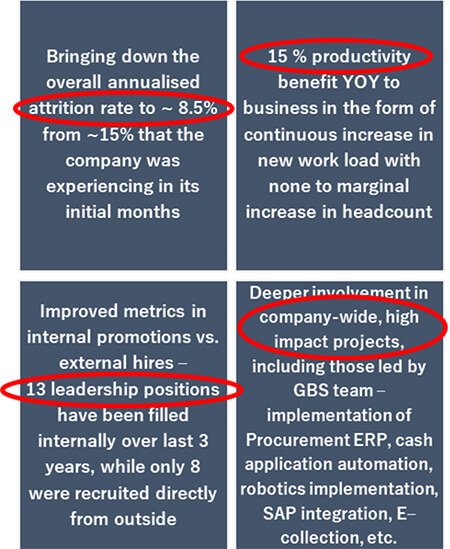
The Challenge of Creating a Hum-Bot Organization
Technology advancements provide huge opportunities for businesses success. Robotics (or RPA) has become a buzzword in the industry and is one of the most often implemented tools in the business services industry. It is the automation of repeatable, rule-based human actions using robotic software. RPA provides a wide range of opportunities for organizations to automate simple tasks and reallocate employee resources to focus on more complex endeavours. One of the biggest obstacles to adopting this technology is the human mind-set itself and an inherent reluctance to change. In any workplace, there are those who embrace change and those who reject it. For a veteran manufacturing industry like JSW, this is a real challenge.
“50% of ERP implementations fail. Of those failures, 87% are because of user adoption issues, not software or technology issues” as per the Gartner & KPMG Studies. Another research by Gartner tells us that 92% of transformation program failures are due to people, organization and leadership shortfalls.
Keeping the above data point in mind, JSW decided to carry out its RPA implementation program with a bottoms-up approach. The human angle was kept in mind at all times. Initially, employees had lot of questions and curiosity in terms of their career path, job security etc.

The leadership decided to do a step-by-step organizational transformative change on a large scale. This involved transforming the culture of the organization to one that embraces and manages change and engages its employees and other stakeholders to gain their trust and confidence in every step of the way.
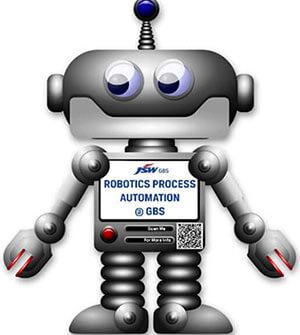
“50% of ERP implementations fail. Of those failures, 87% are because of user adoption issues, not software or technology issues” as per the Gartner & KPMG Studies. Another research by Gartner tells us that 92% of transformation program failures are due to people, organization and leadership shortfalls.
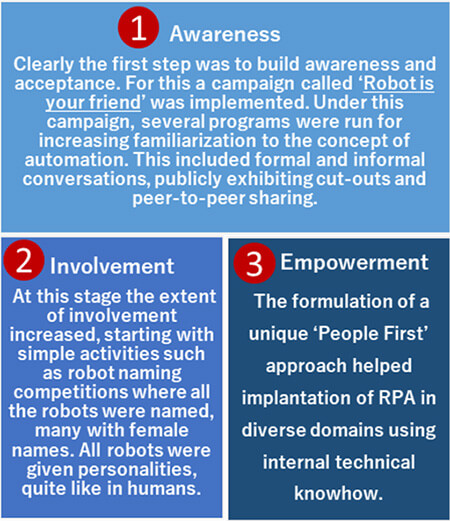
The approach to the project implementation using people strategy as the principal backdrop helped create the Hum-Bot organization, where humans and robots coexist carrying out their respective roles, supporting each other. This peaceful and happy coexistence is possible because of the interdependence of humans and robots and the assurance that neither is a threat to the other.
Around 25% of the GBS employees are trained on basic robotics and wherever implemented, it has resulted in a straight 20% efficiency improvement purely on utilized manpower basis.
The well-planned roadmap ensured that the strategy was well supported by employees and a severe change management issue got resolved amicably.
A reputed RPA implementation industry leader has awarded JSW GBS as the fastest implementation project in the manufacturing industry.
The Future has a Human Face
All leaders at JSW understand that for their organization's long-term health, the choice and cultivation of its future leaders is most critical. Performance, culture and talent management practices go together to make up the entire process of developing the organization into a mature and successful business. The role of right people practices is key to this symbiotic approach and hence should be well chalked out and correctly implemented.
ABOUT THE AUTHOR
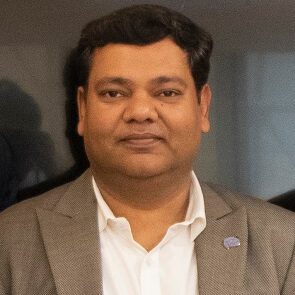
Navneet Bansal has a passion to establish and grow shared services centers. He is a Chartered Accountant with 23 years of work experience. With a career spanning from big four consulting to global tech companies and now with largest steel producer in India, Navneet has worked within various international and domestic work cultures. Status quo is a big ‘No’ for him. He loves doing new things and experimenting to continuously improve the self and organizations he works for. Navneet is a peoples’ person. He has been a speaker at multiple industry forums, IIMs, and national as well as international institutions.



 Ask an Expert
Ask an Expert



